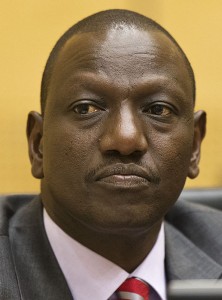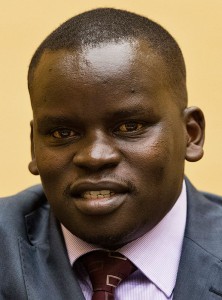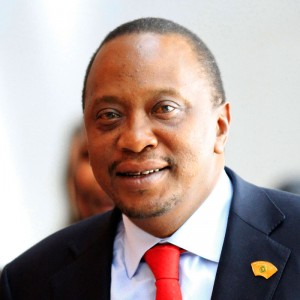
William Samoei Ruto © Michael Kooren / AFP / Getty Images

Joshua arap Sang © Michael Kooren / Reuters
Case One (Terminated)
Names: William Samoei Ruto and Joshua arap Sang
Nationality: Kenyan
Summons to appear issued: March 8, 2011
Charges: Ruto is alleged to be an indirect co-perpetrator of crimes against humanity of murder, forcible transfer, and persecution. Sang is alleged to have contributed to the commission of the crimes.
Trial start date: September 10, 2013
Charges terminated: April 5, 2016

Uhuru Muigai Kenyatta © Tiksa Negeri / Reuters
Case Two (Terminated)
Name: Uhuru Muigai Kenyatta
Nationality: Kenyan
Summons to appear issued: March 8, 2011 (no longer in place as of March 13, 2015).
Charges: Kenyatta was alleged to be indirect co-perpetrators of the crimes against humanity of murder, forcible transfer, rape, persecution, and other inhumane acts.
Charges terminated: March 13, 2015
Introduction
The International Criminal Court’s (ICC) fifth-ever investigation has focused on the period of violence that followed the disputed presidential elections in Kenya held on December 27, 2007. In December 2010, the prosecutor requested that six individuals be summoned to appear before the court in two separate cases. Charges against two of them, Henry Kiprono Kosgey and Muhammed Hussein Ali, were rejected by Pre-Trial Chamber II on January 23, 2012.
The remaining four accused were divided into two separate cases. The first case involves two members of the Orange Democratic Movement (ODM), the opposition party at the time of the elections, and case two involves two members of the Party of National Unity (PNU), then the incumbent party. The prosecutor has brought charges against Ruto and Sang, members of the ODM at the time of violence, for the crimes against humanity of murder, forcible transfer, and persecution, allegedly committed against supporters of the PNU.
The prosecutor also brought charges against Francis Muthaura and Uhuru Kenyatta, members of the PNU at the time of the violence, for the crimes against humanity of murder, forcible transfer, rape, persecution, and other inhumane acts allegedly committed against ODM supporters, partly in retaliation against attacks against the PNU supporters. The charges against Muthaura were withdrawn in March 2013. The charges against Kenyatta were withdrawn in December 2014, terminating the case before the trial chamber.
The following overview looks at the cases in more detail.
How did the ICC become involved in Kenya?
Kenya ratified the Rome Statute, the founding treaty of the ICC, on March 15, 2005. This allowed the court jurisdiction over war crimes, crimes against humanity, and genocide committed by Kenyan nationals or on Kenyan territory after July 1, 2002 – the date that the Rome Statute entered into force. However, the ICC only has jurisdiction in cases where the government proves unwilling or unable to investigate and prosecute those crimes.
The Government of Kenya established an international Commission of Inquiry on Post Election Violence (CIPEV) in February 2008, which became known as the Waki Commission after the Kenyan Court of Appeals Judge Philip Waki, who chaired the body. The Waki Commission published a report recommending that the government establish a special tribunal of national and international judges to investigate and prosecute perpetrators of the post-election violence. However, it was made clear that if the tribunal was not set up within a certain period, information collected by the Waki Commission would be passed to the ICC, including a sealed envelope of names of those suspected to be most responsible for the violence. In February 2009, the Kenyan parliament voted against a bill to establish the special tribunal, and no further action was taken by the government. Therefore, in July 2009, the ICC prosecutor was sent extensive documentation compiled by the Waki Commission.
On November 26, 2009, following analysis of this documentation, the prosecutor requested authorization from the court to open an investigation into crimes against humanity allegedly committed in relation the post-election violence in Kenya. This was the first time that the prosecutor had invoked the proprio motu powers granted to him under Article 15 (3) of the Rome Statute (i.e. the right to initiate an investigation at his own instigation, without a referral from the State Party or the UN Security Council). The request was authorized by a majority decision of the pre-trial chamber on March 31, 2010.
How did the ICC prosecutor investigate and arrest suspects?
The Prosecutor’s investigation led him to identify six individuals that he alleged were responsible for crimes against humanity. On December 15, 2010, he submitted an application (accompanied by thousands of pages of supporting documents) requesting court summonses for these six people, divided into two separate cases. The Pre-Trial Chamber reviewed this evidence and determined that there were reasonable grounds to believe that those individuals had committed the crimes alleged in the Prosecutor’s application. The request was therefore granted, and the summonses were issued, on March 8, 2011. Charges against Ruto, Sang, Muthaura, and Kenyatta were confirmed on January 23, 2012.
Summonses were deemed sufficient to ensure that the people in question would come to the Court (otherwise warrants of arrest would have been issued).
What was the result of the confirmation of charges hearing?
The confirmation of charges hearing for Ruto, Kosgey, and Sang took place from September 1 to 8, 2011 at the International Criminal Court. The hearings for Muthaura, Kenyatta, and Ali lasted from September 21 to October 5, 2011.
The decision on the confirmation of charges for both cases was announced on January 23, 2012. Pre-Trial Chamber II found that based on the evidence presented by the prosecution that the crimes against humanity charged in case one – murder, deportation or forcible transfer, and persecution – had been committed. The judges further stated that there are substantial grounds to believe Ruto is responsible for those crimes against humanity as an indirect co-perpetrator, and Sang contributed to the crimes committed by a group of persons, led by Ruto, who had a common purpose. The charges against Kosgey were rejected.
In case two, the judges also held that the evidence established substantial grounds to that the crimes against humanity charged – murder, deportation or forcible transfer, rape, other inhumane acts, and persecution – were committed. The pre-trial chamber found substantial grounds to believe Muthaura and Kenyatta were criminally responsible for the alleged crimes as indirect co-perpetrators. The charges against Ali were rejected.
Why were charges not confirmed against Ali and Kosgey?
On January 23, 2012, Pre-Trial Chamber II found that the prosecutor’s evidence failed to satisfy the evidentiary threshold required under the Rome Statute to bring Kosgey and Ali to trial. Specifically in regards to Kosgey, the chamber found that the prosecutor relied on one anonymous and insufficiently corroborated witness. The chamber also determined that Kosgey suffered prejudice due to the redaction of certain dates related to a number of meetings that he allegedly attended, which proved to be essential for his defense and for the finding on his criminal responsibility.
With regards to Ali, the chamber found that there was not sufficient evidence to connect the Kenya Police to attacks carried out in the areas where perceived ODM supporters resided. The Prosecutor alleged Ali, the former Commissioner of the Kenya Police, contributed to the crimes through directing the Kenya Police to not prevent attacks carried out by PNU supporters. Without sufficient evidence of police involvement, however, the chamber declined to confirm charges.
Why were charges later dropped against Francis Muthaura?
On March 11, 2013 the Office of the Prosecutor announced it was dropping all charges against Muthaura, saying it now had insufficient evidence to have a reasonable hope of a conviction. It cited in particular the loss of a key witness who had recanted testimony and claimed to have received bribes from defendants in the case, the deaths of other potential witnesses since 2007/8, and a lack of cooperation from the Kenyan government in gathering testimony.
Why were charges dropped against Uhuru Kenyatta?
On December 5, 2014, the Office of the Prosecutor announced it was withdrawing all charges against Kenyatta. The decision followed a trial chamber order rejecting a request to postpone the trial and that the prosecutor give notice within one week whether she will withdraw the charges or proceed to trial. (In September 2014, the prosecutor requested an indefinite adjournment to the trial because the evidence was “insufficient to prove Mr. Uhuru Kenyatta’s alleged criminal responsibility beyond reasonable doubt.”) In the withdrawal notice, the prosecutor stated that the evidence had not improved and cited a lack of cooperation from the Kenyan government as part of the reason for dropping the charges.
On March 13, 2015, the judges of Trial Chamber V(b) unanimously terminated the proceedings against Kenyatta as well as his summons to appear. However, the chamber noted that if new evidence became available, the decision to terminate proceedings would not prejudice the prosecution from bringing charges again.
Why were the charges terminated against Ruto and Sang?
In a majority decision issued on April 5, 2016, the judges of Trial Chamber V(a) terminated the charges against Ruto and Sang because the evidence against them was weak. The judges said witness intimidation and bribery was a key factor in the deterioration of the evidence against the two though the judges said there was no evidence that either Ruto or Sang were involved in interfering with the witnesses. The judges made the decision to terminate the charges against Ruto and Sang before the two presented their defense. This decision is the first at the ICC that addresses a “no case to answer” application filed by the defense of an accused person after the prosecution has concluded their case.
The arrest warrants for offense against the administration of justice
The ICC has issued arrest warrants for three Kenyan individuals for allegedly bribing or attempting to bribe eight prosecution witnesses in the now-terminated case against Ruto and Sang. The first arrest warrant was issued in August 2013 against a former journalist, Walter Osapiri Barasa, for his alleged bribing or attempting to bribe three prosecution witnesses. Barasa challenged the arrest warrant in the Kenyan courts and that challenge is yet to be resolved. The second arrest warrant was issued in March 2015 against lawyer Paul Gicheru, and another individual, Philip Kipkoech Bett. They are alleged to have bribed or attempted to bribe six prosecution witnesses. There is an overlap between the arrest warrants for Barasa, Gicheru, and Bett which is why the total number of prosecution witnesses involved is eight.
Domestic cases related to post-election violence crimes
There are three public interest cases being heard at the High Court of Kenya involving different categories of survivors of the violence that engulfed the country between December 2007 and February 2008. The first, filed in November 2011, concerns 25 people displaced from their homes. The second, filed in February 2013, involves eight survivors of sexual and gender based violence. The third case, which was first filed in February 2013, involves 13 victims of police shootings. In each case, the citizens concerned and non-governmental organizations supporting them are asking the court to find the government failed to protect them and award reparations to them.
What is the background to the post-election violence in Kenya?
The post-election violence in Kenya from December 2007 to February 2008 echoed the outbreaks of violence that have followed national elections since the multi-party system was established in the country in 1991. In 2007-2008, the violence was ignited by allegations of election fraud. The main opposition party, the Orange Democratic Movement, had been successful in the parliamentary vote, and its presidential candidate Raila Odinga was showing a lead of a million votes towards the end of the vote count. But in the last few hours of vote counting resulted in an apparent victory for the incumbent President Kibaki of the Party of National Unity. Violence took place in many regions of Kenya and as yet, few perpetrators have been held to account.
The ICC prosecutor alleges that the post-election violence was coordinated and targeted civilians. The ICC prosecutor argues that initially, ODM opposition supporters were mobilized to attack ethnic Kikuyu and others perceived to have voted for President Kibaki of the PNU. It is further alleged that retaliation was then targeted at people of Kalenjin, Luo, and Luhya ethnicity, who were perceived as affiliated with the ODM opposition party. There are also allegations of police violence at this time. In the period from the December 27 election to February 28, 2008 (when a power-sharing deal was struck between the two main parties), it is reported that between 1,133 and 1,220 people were killed, 3,561 were injured, and approximately 350,000 were displaced. An increased number of rapes and acts of sexual violence also took place during this time.
